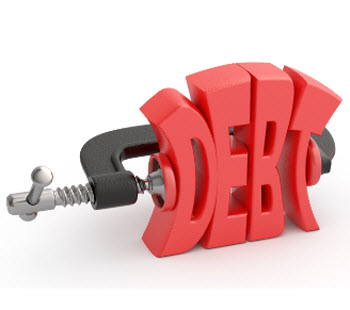Making Every Cent Count on a Low Income
Living pay check to pay check can be difficult, especially if you have a family and mouths to feed. If you are a low-income earner and want to get ahead, there are proven financial strategies that you can use to improve your money situation and make progress towards your financial wants and goals.
The great news is that getting ahead is not that difficult if you know what you’re doing and follow a few simple set of principles. There are no huge challenges in starting, it’s really simple actually - The biggest deterrent of real progress is procrastination and un-realistic expectations.
The following information is a good basis in which to start to get your financial house in order. It’s really a mix of organizing your finances properly and taking advantage of any help to speed up the process in controlling your money and getting ahead.
To be successful you have to create and follow a plan – you must be proactive!
Controlling money and getting ahead is a simple as tackling the below:
- Budgeting
- Benefits/Entitlements to help with living costs and bills
- Banking/Savings
- Stay out of debt
- Professional Help if Needed (free)
Do you have a budget?
When there's little money coming in, it’s absolutely vital to know where your money is going. Budgeting may not be the most exciting thing to do but it is essential if you want to stay out of debt and get ahead. Just like any business who has an accounts department to watch their cash flow – you must watch yours.
If you don’t already have one, it is imperative you create a household budget. There are numerous apps and free resource available to you, whether it be from your bank, online or free community services which can assist. Learn more about practical and simple budgeting here.
Maximize your benefits and entitlements
There are numerous Federal and State level financial support problems provided by the government. In addition, many non-for-profits and corporations have assistance programs as well.
Depending on your circumstances, you may be able to get financial support. Below are examples of different types of benefits and entitlements that can help with different monthly living costs.
- Rent or Mortgage Assistance via The Department of Housing & Urban Development (HUD)
- Utility bills help through The Department of Energy
- Medication help through The National Association of Free and Charitable Clinics (NAFCC)
- Phone bill help through LifeLine
- Child care assistance through Child & Dependent Care Credit Program
- Education assistance through Pell Grants and Federal Work-Study Programs
- Subsidized internet programs through corporate and government partnerships like Connect2Compete
The above is just a small sample of the numerous financial assistance programs provided. Taking advantage of these benefits will really help balance the family budget and allow you to start controlling your money, staying out of debt and establish savings.
Find a bank account and saving programs that suits you
Do not stick with a bank because it’s the first bank you ever partnered with - It may not be the best bank for you now. Shop around for bank accounts and be very aware of their terms. A bank may provide a great advertised rate to get you to sign with them but the reality of the account can be far from perfect.
Having the wrong type of bank account can really cost you money in the long run. The cost of financial products can really vary.
Here are some things to look for when shopping around for bank account.
- No account keeping fees
- Free monthly statements
- No minimum deposit amounts
- No overdrawn fees
- Online access
When looking at financial institutes, keep credit unions and online banks in mind as they are very competitive and may provide you with more bang for your buck. Always check third party review sites to help with your research on picking a new bank or financial institute.
Saving Programs
Many low income earners think, what’s the point of saving when I have so little to save. The importance of saving is vital to obtaining the skills for strong personal finance habits. The amount you save is important but not as relevant as establishing good financial habits and discipline.
There are things you can do to help accelerate you savings. You will be pleasantly surprised to see how quick savings can add up over time. Check out these strategies to help you on your way for paying yourself for all the hard work you do.
Things to do and saving concepts to remember:
- Take advantage of matched saving account programs such as https://cfed.org/programs/idas/
- Money in your wallet or purse will always vanish and you don’t miss money that you don’t get. Have a small percentage of every pay check or income stream go into your savings account. Set this up once and just forget about…your savings will grow quickly.
- Regularly clean out the house with the intent of selling or donating things that aren’t being used and apply the cash to your savings. The internet makes it easy to sell things!
- If you are paying down debt, once that debt has been cleared – redirect the old debt repayments to your savings.
- DON’T TOUCH YOUR SAVINGS INLESS ITS PART OF YOUR SAVINGS PLAN – YOU MUST LET IT GROW. Create multiple savings accounts for different things!
Staying out of debt
The cycle of debt is one of the biggest obstacles in getting ahead if not the biggest. There is good debt which is debt used for purchasing appreciating assets, however most people find themselves dealing with bad debt.
If you have personal debt you should do everything in your power to accelerate your repayments to get out of it - Avoid just making the minimum repayment.
Avoid consumer debt wherever possible, things to think about to assist you with staying out of debt.
Things to do to avoid debt and unnecessary costs:
- Late fees: You should never have late fees if you have a good budget in place. Stay on top of your bills to ensure you don’t have to take on any unnecessary costs in the form of fees. If you simple don’t have the money or are short, contact your creditors ahead of time and they will work with you and not charge you a fee.
- Set aside some money: Add up how much your big bills cost in total for the year; things like birthdays, Christmas, insurance, etc. Create a special savings account that you can use to set aside money in monthly increments that add up to what you need for the different annual expenses at the time of need. This will keep you from putting these types of expenses on credit cards or eating into your other savings accounts.
- Avoid credit: Simply don’t purchase things on credit in less it’s an absolute necessity and then be sure to pay it off as soon as possible.
- Attitude: You must change your attitude towards consumer debt. Think about things that bother you the most, this is how you should think about debt.
Professional Help
Sometimes things can just be overwhelming or your finances may be in such a bad state that you need additional help in what you should do. There are numerous organizations that provide free professional help. They are unbiased professionals that have heard and seen it all – more importantly, they have helped thousands of Americans get back on their feet.
Organizations that can provide assistance include – Credit Counsellors, Community Action Centers and Charities.
Living on a low income can be challenging, but for those who want to control their money and start to get a head – it’s as simple as taking action and following proven financial principles.



